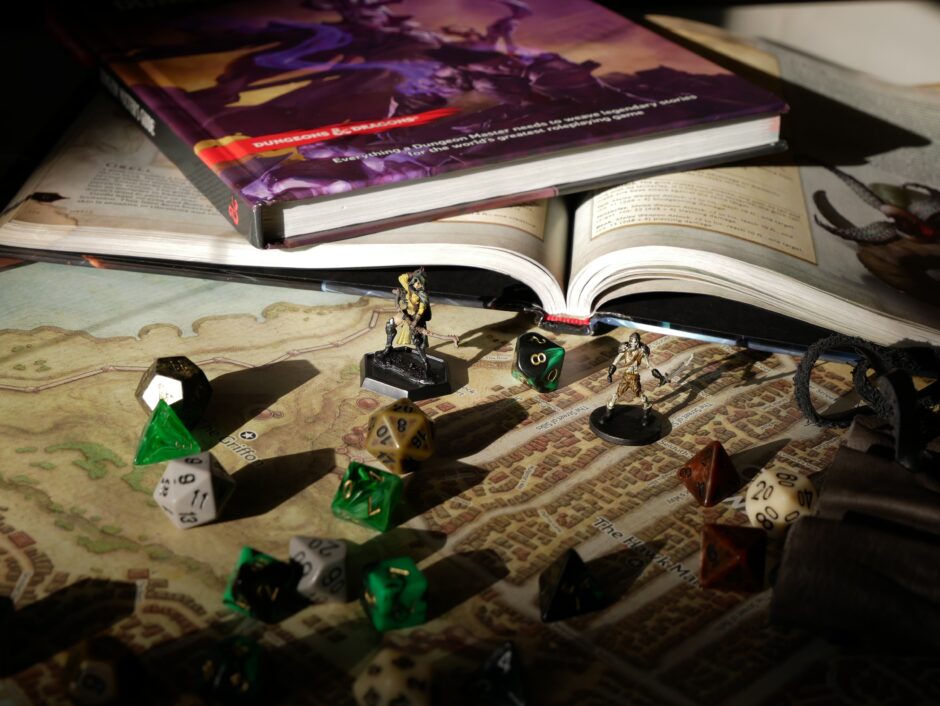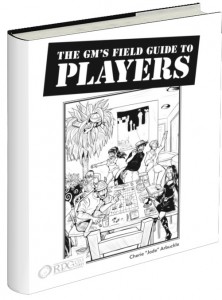 Do you remember your first game session? Yeah, I know it’s probably been a while, but I bet you remember how overwhelmed you felt. You had this sheet plopped down in front of you, covered with numbers and strange acronyms that may as well have been ancient Egyptian for all you understood it. And then there were some of the strangest dice you’ve ever seen. But worst of all, everyone else at the table was shouting out things in a strange garbled tongue.
Do you remember your first game session? Yeah, I know it’s probably been a while, but I bet you remember how overwhelmed you felt. You had this sheet plopped down in front of you, covered with numbers and strange acronyms that may as well have been ancient Egyptian for all you understood it. And then there were some of the strangest dice you’ve ever seen. But worst of all, everyone else at the table was shouting out things in a strange garbled tongue.
Remember that feeling? Good. Now hold onto it as you read this next post, the second in my series on introducing new players to roleplaying. Last post, I covered what to do if you’re running an entire group of new players. Today I’m covering how to introduce a new player to a group of experienced roleplayers.
Before Adding a New Player
First and foremost, you need to make sure the rest of your players are okay with the idea of new players. Many experienced groups become very insular and can be unwilling to accept a new player into their ranks, especially if the the player is brand new to roleplaying.
Talk with your group. Ask them how they feel about adding another player. If they’re not comfortable with the idea, you may have to consider other options, if you really want to bring this new player into the hobby and you have the time and energy to run more than one game. You’ve got a couple of options:
- Run a one-on-one game with just her and you
- Try to find more new players to form a beginners’ game
Know Your Limit
For the purpose of this post, I’m assuming that your group is okay with adding a new player. But what about you? You need to make sure you’re okay with the added responsibility of adding a brand-new player to your game. Is your game under control? Can you handle the extra workload?
Every GM has a optimal number of players he feels comfortable running. This ideal number varies depending on:
- the game system you’re using. Some games work better with smaller or larger groups,
- how familiar you are with the system,
- the current mix of players in your group,
- how high-maintenance you’re current players are.
For example,my optimal group size is around eight players; my games have a lot of PC interactions and politics. Many other GMs prefer smaller groups of four to six players. However, when I run LARPs, my optimal size is around thirty players and when I run FASA’s classic Doctor Who game, I prefer a group size of three.
Think back over other games you’ve run. At what point (in number of PCs) did you feel like you started to lose control of the game? On the other hand, was there a game you felt didn’t really work because you didn’t have enough PCs? Usually having too many PCs is more of a problem than having too few, so if you’re in doubt, don’t add any more players. Especially brand-new players who will require more of your time and energy than an experienced player would.
Preparing the new player to play
Assuming you’re able to handle another player and your group is okay with the idea, you can go ahead and talk to your brand-new player about joining. Let her know that kind of game you’re running. Go beyond naming the system and stay away from describing mechanics. A “near-future variant of the d20 system, only using spell points and increased technology to give it a Shadowrun feel” won’t tell her if she’d be interested in playing.
Describe your game in plain words. A better way to describe the above game would be “a dark, cyberpunk-type game set in an alternate near-future that has slightly more advanced technology than we have now, but also has magic and magical races, such as elves, ogres, and dwarves. If you can, find a movie or TV show you can compare it with. That gives the new player some basis to know if she’d be interested or not.
Try to give her a feeling for the mood and themes of your game. It’s great that it’s a near-future game with magic, but are the PCs a dedicated group of cohorts who can trust each other completely (like Babylon 5) ? Or are you running a game where people’s minds are messed with on a regular basis, the enemy has spies planted inside the group of PCs, who, themselves, may not be who they think they are (like the most recent Battlestar Galactica).
Encourage your prospective player to come watch a session or two of your game (provided the other players are okay with this). That will give her the best of idea of what your game is like. Tell you current players that she’s coming and ask them to make an effort to welcome the her.
Once your potential player tells you she’s interested, let her know what she needs to have. Does she need her own dice and book(s)? If so, let her know in advance of her first play session. Tell her where she can get them and exactly which books she needs to buy. It’s also a good idea to let her know what books she won’t need, if any. Game books aren’t cheap these days and it can be frustrating to pay out $20-50 on something, only to discover you’ll never get a chance to use it.
Consider letting her borrow books and dice for the first few game sessions, until she knows whether or not she likes the game enough to stick with it. Or you can pass the hat and have your current group chip in together to buy her a set of dice and copy of the core rules. Many games have PDF versions of their rules, which are usually much cheaper and allow a player to print out only the section of the rules she needs. If you go the PDF route, give her a range of pages to start with (i.e., “print out the character creation rules–they’re on pages 18-36”).
It’s also helpful to create a “cheat sheet” of the most basic rules a player needs to know. I’m not talking about copying whole sections of the book: just create a one or two page sheet of the most common mechanics. This will give her something to look at during the game section (it would also help to page note this sheet so she can look the rules up in the actual book, if she needs to). That way, she doesn’t need to be flipping page after page to find how to role for initiative in the middle of combat.
Fill her in on any house rules you use, as well as any behavior expectations any “table rules” you may have. For example: “if a die rolls off the table, it must be rerolled” or “once the game starts, I assume everything you say is in character.” Don’t forget to include any group traditions, such as “everyone in the group chips in for pizza.”
It’s also good to give a brand-new player a glossary of common gaming terms. We, as experienced players, tend to forget that not everyone knows what “hit points” are or what “NPC” stands for. We forget that it sounds like a foreign language to someone brand-new, who’s still learning that AC has nothing to do with electricity.
———
Next time, I’ll cover character creation with a brand-new player, as well as tips for bringing that character into your game without ruffling feathers.
[Image by JGNY from Flickr Creative Commons].
Other posts in this series:





















